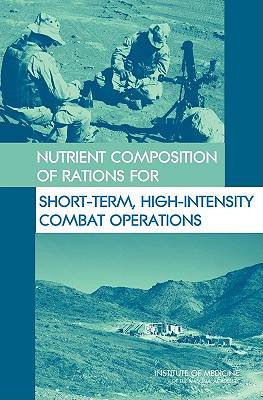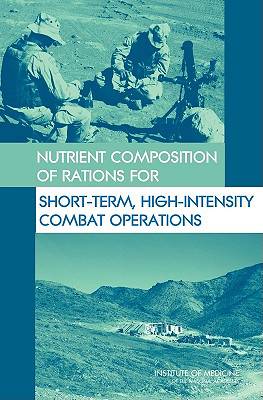
- Afhalen na 1 uur in een winkel met voorraad
- Gratis thuislevering in België vanaf € 30
- Ruim aanbod met 7 miljoen producten
- Afhalen na 1 uur in een winkel met voorraad
- Gratis thuislevering in België vanaf € 30
- Ruim aanbod met 7 miljoen producten
Zoeken
Nutrient Composition of Rations for Short-Term, High-Intensity Combat Operations
Institute of Medicine, Food and Nutrition Board, Committee on Military Nutrition Research, Committee on Optimization of Nutrient Composition of Military Ra
Paperback | Engels
€ 85,45
+ 170 punten
Omschrijving
Recognizing the importance of good nutrition for physical and mental status, the Department of Defense asked the Institute of Medicine to guide the design of the nutritional composition of a ration for soldiers on short-term, high-stress missions. Nutrient Composition of Rations for Short-Term, High-Intensity Combat Operations considers military performance, health concerns, food intake, energy expenditure, physical exercise, and food technology issues. The success of military operations depends to a large extent on the physical and mental status of the individuals involved. Appropriate nutrition during assault missions is a continuous challenge mainly due to diminished appetites of individuals under stress. Many less controllable and unpredictable factors, such as individual preferences and climate, come into play to reduce appetite. In fact, soldiers usually consume about half of the calories needed, leaving them in a state called "negative energy balance." The consequences of being in negative energy balance while under these circumstances range from weight loss to fatigue to mental impairments. An individual's physiological and nutritional status can markedly affect one's ability to maximize performance during missions and may compromise effectiveness. With the number of these missions increasing, the optimization of rations has become a high priority.
Specificaties
Betrokkenen
- Auteur(s):
- Uitgeverij:
Inhoud
- Aantal bladzijden:
- 462
- Taal:
- Engels
Eigenschappen
- Productcode (EAN):
- 9780309096416
- Verschijningsdatum:
- 9/01/2006
- Uitvoering:
- Paperback
- Formaat:
- Trade paperback (VS)
- Afmetingen:
- 152 mm x 229 mm

Alleen bij Standaard Boekhandel
+ 170 punten op je klantenkaart van Standaard Boekhandel
Beoordelingen
We publiceren alleen reviews die voldoen aan de voorwaarden voor reviews. Bekijk onze voorwaarden voor reviews.











